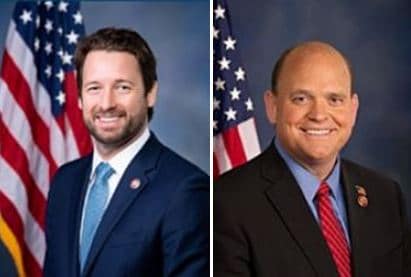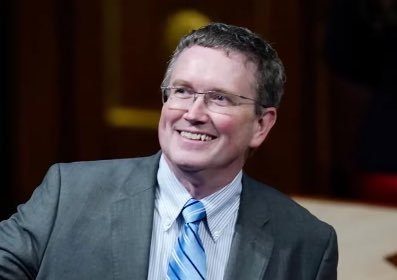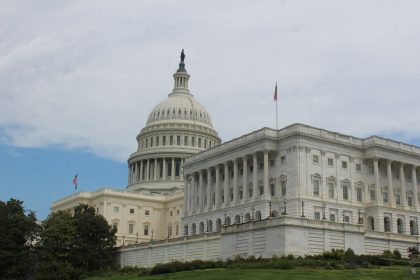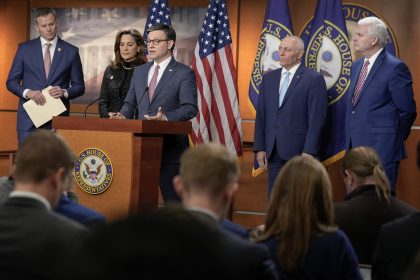Cunningham, Reed, Call for COVID-19 Relief, Civility During Bipartisan Town Hall

WASHINGTON – It came as no surprise last week when the majority of questions posed to two members of Congress during a virtual town hall Friday focused on currently stalled negotiations over the next COVID-19 relief package.
Despite being on opposite sides of the aisle, both Reps. Joe Cunningham, a South Carolina Democrat, and Tom Reed, a New York Republican, as members of the House Problem Solvers Caucus, have been actively pushing for a resumption in stimulus package talks.
But the conversation took an unexpected turn, when Reed spoke at some length about unsettling events that have accompanied his bid for re-election.
On Friday, Oct. 23, Reed said, he was out campaigning when he received a frantic call from his wife. Someone had left a brick with the name of one of their children printed on it at the front door of their Corning, N.Y., home. Next to the brick was a dead rat.

The incident came two months after someone threw a brick through the Reed campaign office window in downtown Corning.
The FBI and Capitol Hill police are investigating both incidents, which Reed has described as an attempt by “cowards” to “try to intimidate us.”
Reed’s Democratic opponent in Tuesday’s election, Tracy Mitrano, released a statement calling the incidents “shocking.”
During Friday’s town hall, as Rep. Cunningham encouraged his congressional colleague to talk about the incident, Reed still seemed mystified by it.
“I mean, I come from Western New York State. We’re not city New Yorkers,” he said. “I’m a country lawyer. I live in the house my grandfather built 100 years ago. … in a rural area of Western New York.
“To provide you with a little perspective, I’m closer to New York City when I’m in my office in Washington, D.C. than I am when I’m sitting in my living room,” Reed continued.
“Earlier in this campaign cycle, I had a brick thrown through my campaign window that landed where my young staffers do their work. Then most egregiously, I rush home to find that a brick with my child’s name on it and a dead rat with a noose around its neck had been delivered to me.”
“Obviously, this is a very unsettling thing to have had occur,” Reed said. “And obviously, my wife and daughter, and my son … didn’t run for public office. And even as a public official, no public official deserves to be the target of this kind of action.”
“Across the country, politics has taken a disturbing turn,” Reed said. “We have to overcome this. I know that we can. We are all Americans first. What unites us is far greater than our political differences. Sadly, this is a sign of our times.”
Divisive Times
The divisiveness of these “times” is exactly what the Problem Solvers Caucus has been striving to overcome when it comes to getting to the finish line on another COVID-19 relief package.
In early September, the caucus, a group of 25 Democrats and 25 Republicans took to the steps of the Capitol to unveil what they called their “March to Common Ground” framework, a proposal designed to kick start negotiations and break the partisan gridlock surrounding COVID-19 relief.
Treasury Secretary Steven Mnuchin later lauded the caucus for pushing the process forward, and said he was hopeful the White House and House Speaker Nancy Pelosi would be able to strike a deal on something that resembled the roughly $1.5 trillion the Problem Solvers proposed.
“It’s clear more legislation is desperately needed,” Cunningham said. “Families and small businesses are struggling … and we can’t just turn our backs on them, especially when we know a deal is possible.
“The Problem Solvers, as a caucus, Democrats and Republicans came together and agreed on a framework,” he said. “When Congress gets back to Washington for the lame duck session, we’ve got to pass COVID-19 relief legislation and fund the government.
“Inaction on either of these is simply not an option,” Cunningham said.
Solving Problems While Respecting Differences
Reed, who is co-chair of the caucus with Democratic Rep. John Gottheimer of New Jersey, said a fundamental, but sometimes misunderstood aspect of the group, is its ability to meet and walk through issues without members compromising their political beliefs.
“I am a proud Republican, and I bring my beliefs to the table,” he said. “Joe is a proud Democrat, as is Josh and my other colleagues from the other side of the aisle, and they bring their beliefs to the table.
“But one of the things we commit to as members of the Problem Solvers Caucus is listening to each other and staying in the room — even when we passionately disagree — to find that common ground that we can agree on,” Reed said.
“I think that’s one of the lessons we can all learn from former President Ronald Reagan and former House Speaker Tip O’Neill: There are more things we are united on in America than we are in disagreement on,” he added.
Reed said after a decade on Capitol Hill, he’s been astonished by the divisiveness that’s pushed members of Congress — and members of the greater society — into separate camps.
“It’s manifesting itself, right now, in this election cycle,” he said. “I never thought I would see such polarization in our country’s history.”
“Folks are just so focused on politics, 24-seven, that I think they forgot why the people elected them,” Reed continued. “They’ve forgotten they were elected to do the people’s work.”
“Yes, they should be proud of the debate on important issues, and proud to engage in the political process, but at the end of the day, you have to make sure you always do the people’s work and let the politics … take care of itself,” he said.
Reed said as soon as Congress returns, he and the other members of the Problem Solvers Caucus will be pushing hard to see that a deal on COVID-19 relief is done sooner rather than later.
“We can’t wait until February, and if people like us don’t step forward and put pressure on to get this deal done … I’m afraid it just won’t happen,” he said. “Each and every day past this election that we let this go … the less and less likely it is that we will have a deal before sometime well into February. And that’s just bad for the American people.”
Crafting Solutions from the Ground Up
Both Cunningham and Reed described the process of crafting the Problem Solver’s $1.5 Trillion COVID-19 relief proposal as working from “the ground up.”
“We didn’t start with a top down number,” Reed explained. “We said, ‘What do we need to get between now and March, to be able to reach common ground?”
March was chosen to allow for getting past the election and to get an accurate read on where the economy stands.
In the end, it took three months of Zoom calls and exchanging information for the proposal to come together, or as Reed said, “three months of getting people comfortable with what was needed, with what they could support, and what they couldn’t.
“The process worked because we’ve taken the time to get to know each other. We trusted each other. And there was no political gamesmanship being played.”
Reed bemoaned the fact that House Speaker Nancy Pelosi and President Donald Trump haven’t spoken to each other directly in over a year.
“That’s disturbing, to be perfectly honest with you,” he said. “And it should be disturbing to anyone.”
Reed recalled when Republican John Boehner was speaker, he and then-Minority Leader Pelosi “talked all the time.”
“They knew each other. And when the country faced a crisis, they could actually pick up the phone and talk to each other,” he said. “That doesn’t happen now in Washington, D.C. There is no relationship between these folks. It’s all about power positioning. No one looks each other in the eye anymore.”
Coming Apart at the Seams
As their town hall continued, Cunningham and Reed got further and further into the subject “of what’s happened in Washington.”
Reed blamed the poisoned atmosphere on the rise of cable television, which in turn fostered what he called “a whole political industrial complex.”
“It’s that complex that pulls us apart,” he said. “And the problem is that a lot of members get tied up in that … it’s just structurally how they operate. They don’t know another person. And that’s why they are so willing to throw rhetorical bombs on the floor, or on cable news or at a conference of something. And all that does is contaminate relationships further.
“If you know somebody, like Joe and I know each other, it’s much harder to do that,” Reed continued. “I mean, when this incident happened at my home, Joe was among the first to reach out to me. When you have that kind of relationship, how could I ever consider throwing a political bomb at him, or his family?”
“I think you’re right, we have to do more to forge relationships in Congress,” Cunningham said.
“And if we do it in Congress, I think it will become contagious,” Reed said. “It’ll take hold in the silent majority that’s out there and it’ll spread, across the country.”
With that, Cunningham sought to assure town hall attendees that “there are a lot of good, honorable men and women in Congress.
Reed readily agreed.
“They have a different point of view on where they want to take the country, how they want to solve these problems that we face as a country, but there are good and honorable men and women on Capitol Hill,” he said.
“There are bad folks there,” Reed added. “There are some people that probably shouldn’t be in Congress. But at the end of the day, there are a lot of good folks.”
With that, he made a simple plea to those listening, wherever they were.
“I encourage you, hold them accountable. Look for the good ones, and encourage them to keep up the good work, and they will rise to the top and we’ll get through this polarized time,” he said, adding, “We’ve been through times like these before as a nation and we’ve gotten through them. That’s what makes American resiliency so impressive.”
























